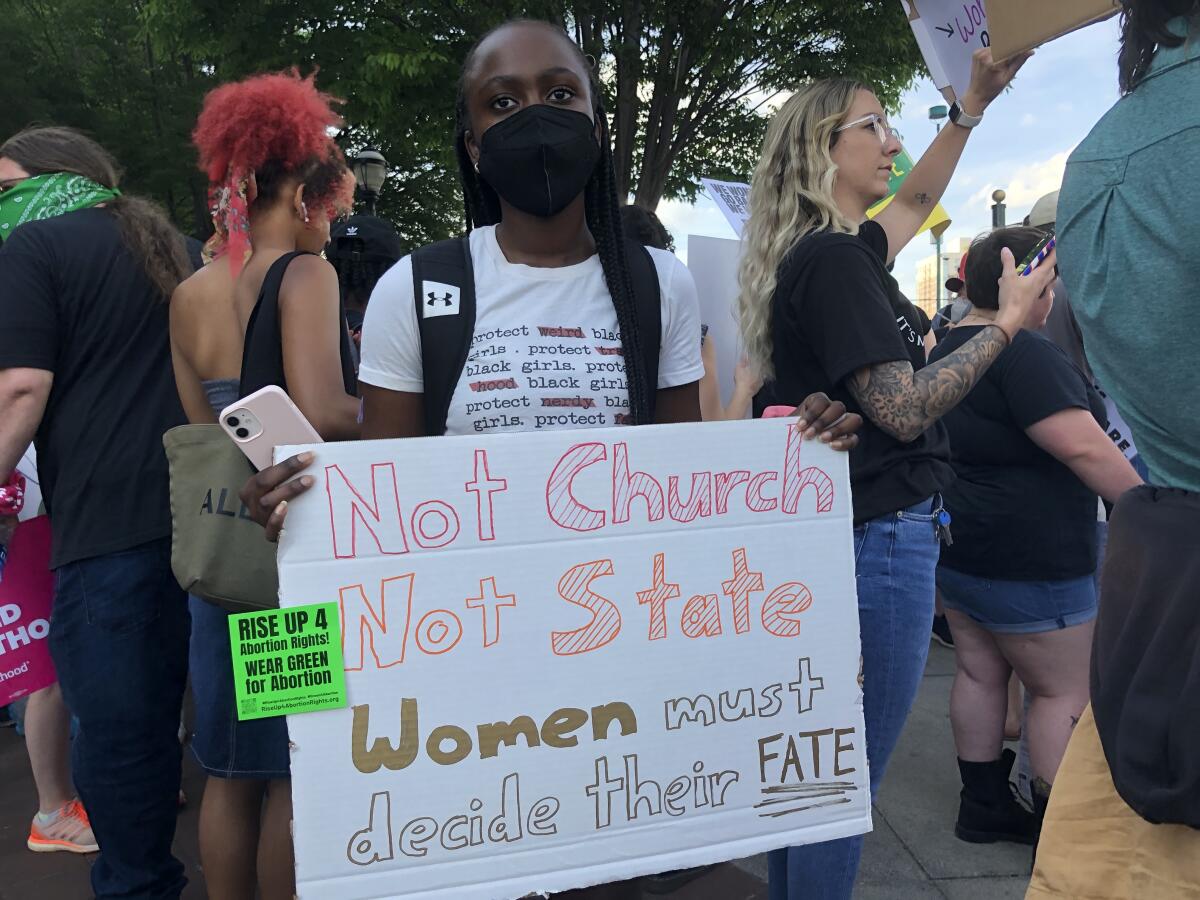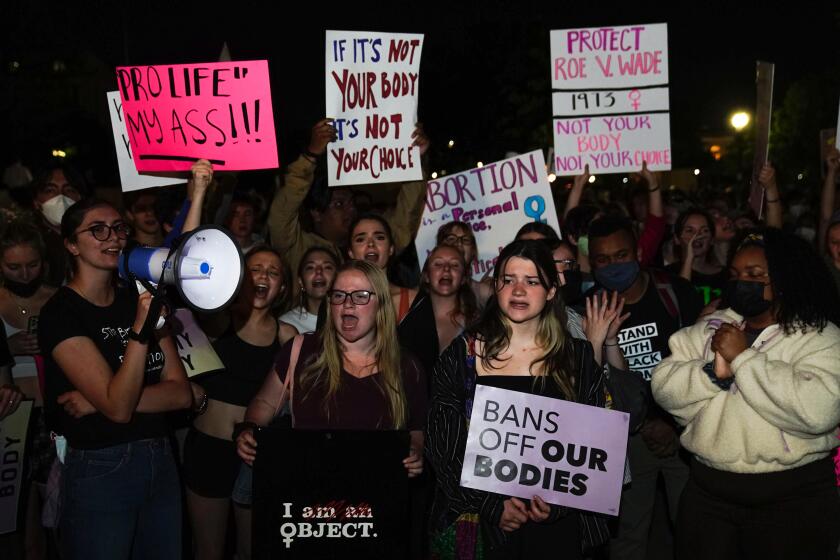Red states are already chipping away at Roe vs. Wade

- Share via
This week’s leak of a draft opinion that would overturn Roe vs. Wade came as more than half of U.S. states are poised to outlaw abortion if the Supreme Court does strike down the 1973 decision. In those states, many in the South and Midwest, it already feels like the landmark decision is being overturned bit by bit as restrictive new laws have been taking effect.
“This is a region of the country where it’s not just an abortion desert — it’s a healthcare desert,” said Rebecca Tong, co-executive director of Trust Women, which runs clinics in Kansas and Oklahoma. “Many of these states did not expand Medicaid. These states have terrible maternal and infant mortality. It’s two separate countries.”
At least 26 states are expected to ban abortion if Roe vs. Wade falls, 13 of them “trigger” states like Oklahoma, with bans set to take effect as soon as the justices rule against Roe. But state lawmakers have not been waiting on the nation’s highest court to pass stricter abortion laws.
On Tuesday, Oklahoma’s Republican Gov. Kevin Stitt signed a law banning abortion after fetal cardiac activity is detected at about six weeks of pregnancy. The so-called heartbeat law will in effect expand the country’s largest “abortion desert.” It was modeled on a similar law Texas enacted last fall, the most sweeping restriction on abortion since Roe vs. Wade.
As news spread of a leaked draft opinion that indicated justices are prepared to overturn Roe vs. Wade, demonstrators headed to the Supreme Court.
Last month, Stitt also signed a bill making it a felony to perform an abortion, punishable by up to 10 years in prison. It’s due to take effect in late August and is likely to face legal challenges.
“I want Oklahoma to be the most pro-life state in the country,” Stitt tweeted Tuesday after signing the new ban.
Trust Women clinics in Oklahoma City and Wichita, Kan., were already handling twice as many patients in recent months because of the Texas ban, Tong said. Now the Oklahoma City clinic is preparing to comply with the new state laws, and the Wichita clinic is expanding ahead of an anticipated increase in patients from Oklahoma.
“We plan to provide abortion care up to the legal limit,” Tong said.
“We are incredibly aware of the need,” she added, “mainly because our phones do not stop ringing.”
The clinics have appointments booked for the next two weeks, which means they can’t serve new clients who need abortions immediately, those who need to travel soon, or those who will soon be too far along in their pregnancies to qualify under state law.
“Everybody in the region is delayed at least two weeks, leading to more complex pregnancies, more surgical procedures and more health risks,” Tong said.
If its Oklahoma City clinic is forced to close, she said, Trust Women plans to shift staff to telehealth services or to their Wichita clinic, which is expanding. But the Wichita site is imperiled, too: In August, voters are set to consider a ballot measure amending the Kansas Constitution to allow state lawmakers to ban abortion if Roe vs. Wade falls.
Though the facility can send women to clinics in neighboring states, Tong said, “the clinics in other states will not have the capacity. It will take a long time for them to build up the capacity to accept the reproductive health populations from other states.”
Here are the basics on the Supreme Court’s upcoming ruling on abortion.
In Shreveport, La., Kathaleen Pittman, the clinic administrator at the Hope Medical Group for Women, said her clinic, 20 miles from the Texas border, was overwhelmed by Texans seeking abortion services after that state’s ban took effect last fall. The share of Texas patients at the Shreveport clinic jumped from 18% to 70%. The clinic now has a waiting list of 300, and more patients are arriving later in their pregnancies.
“We are seeing very few early-first-trimester abortion patients, because it’s taking them so long to get in to see us on any given day,” Pittman said.
Sometimes she tells patients that if they can’t wait a few weeks for her clinic to schedule an appointment, their best bet is to travel to Illinois, which allows abortions until fetal viability, usually around 24 to 28 weeks.
“Patients are upset; they’re terrified,” she said. “Right now, all I can do is take care of as many women as possible and allay their fears as best I can. Beyond that, there’s not much I can do. Worst-case scenario, we’ll take care of patients to the bitter end.”
Chief Justice Roberts calls the leaked draft a “betrayal” and says it will be investigated.
As the Texas ban has forced women to travel farther out of state for abortions, sometimes later in their pregnancies, organizations that help women access abortions have seen their costs rise.
“In Texas, we have been living in a post-Roe environment for more than eight months,” said Neesha Davé, deputy director at the Texas-based Lilith Fund for Reproductive Equity, a nonprofit that helps patients pay for abortions.
Before the Texas ban, 92% of patients assisted by Lillith Fund accessed care in the state; as of January, 80% were traveling out of state, many to Oklahoma, Davé said, “And that has only increased in the months since. People have fewer and fewer options. We do have many clients who are driving to New Mexico, driving to Louisiana and Colorado. Those costs are just increasing and increasing as time goes on.”
The options in southern Texas are even more limited for migrant women in the country illegally, who can’t travel north without passing through U.S. Customs and Border Protection checkpoints, said Nancy Cárdenas Peña, Texas state director for policy and advocacy at the National Latina Institute for Reproductive Justice.
“People often have conversations about whether they’re going to go to their appointment and put themselves in deportation proceedings,” she said.
Abortion restrictions in Texas, Oklahoma, Mississippi and other states have emboldened abortion opponents, who said they were relieved to see the leaked Supreme Court draft opinion from Justice Samuel A. Alito Jr. repudiating Roe vs. Wade.
“I’m encouraged to see that some justices in the high court actually do recognize the violence of abortion and the threat to human life,” said Laura Knight, president of the board of Pro-Life Mississippi, in the state behind the pending Supreme Court case, Dobbs vs. Jackson Women’s Health Organization.
Already, Knight said, Mississippi has made great strides. Last month, Republican Gov. Tate Reeves signed into law the Pregnancy Resource Act, authorizing $3.5 million in tax credits for individuals and businesses that donate to nonprofit faith-based crisis pregnancy centers that attempt to dissuade people from pursuing abortions and offer resources during and after pregnancy.
“Even if it’s a post-Roe era, we expect the abortion industry to continue to spread deception in our state, and so we will be here to shine that truth about abortion,” she said.
Texas lawmakers recently increased funding for the state’s nearly 200 crisis pregnancy centers to $100 million over two years, and antiabortion groups have been lobbying for more assistance for pregnant women who want to stay in school or work, said John Seago, legislative director for Texas Right to Life.
“We’ve already been seeing the preview of a post-Roe world,” he said. “Not fully, but a preview — a glimpse of the policies we need to adopt, the public policy dilemmas we need to solve, if Roe is overturned.”
Since the Texas abortion ban, Seago said, his group has been pushing state officials to enforce the law, including restrictions on mailing abortion medication — “making sure abortion is illegal not just in theory, but in practice” so that “Texas is actually abortion-free.”
Before Monday’s leak, Seago said, he was concerned the court might issue a compromise ruling that wouldn’t fully overturn Roe. While he acknowledged there’s been a backlash to the leaked opinion, he is still encouraged.
“We have confidence that those justices who wanted to head in this direction will maintain their resolve and continue to give a historic victory,” he said.
Seago’s group prayed for the justices on a conference call late Tuesday.
“There’s a lot of attention trying to sway them right now,” he said. “We’re waiting for that final victory.”

In the meantime, Planned Parenthood urged abortion rights protesters to gather late Tuesday in Texas, Georgia and other states.
In downtown Atlanta, a diverse crowd of several hundred people — mostly women, but many men — chanted, “My body, my choice!”
Some wielded handmade placards: “We’re not ovary acting,” “The Bible can be your guide but not my shackle,” and “Motherhood should be a choice.”
Attorney Erin Willoughby, 39, said she feared for her 9-year-old niece.
“What’s going to happen to her rights?” she said. “I want my niece to know we didn’t take this lying down. We fought for her.”
Hoisting a sign that read, “I am a person, not an incubator,” Julianna Whitehead said she didn’t want children and was terrified of having to give birth without health insurance.
“That choice being taken away from me is very scary,” the 28-year-old casting assistant said. “The fact that I have less rights than my mother and grandmother as a woman now in 2022 is ridiculous.”
Brandy Nalyanya, 19, a college student in Decatur, Ga., said she initially felt apathetic when the draft opinion leaked, then grew upset as she contemplated how President Biden and other Democrats could have done more to protect Roe vs. Wade.
“It’s disappointing to vote and to do all of these different things to make sure that our rights would be protected,” she said. “Now we’re seeing that they’re clearly not. It’s disheartening.”
After a procession of activists took to a mic to urge the crowd to hold Supreme Court justices and politicians in the Deep South accountable, the group marched through the streets to Georgia’s Capitol.
“No justice!” they chanted. “No peace!”
More to Read
Sign up for Essential California
The most important California stories and recommendations in your inbox every morning.
You may occasionally receive promotional content from the Los Angeles Times.


















